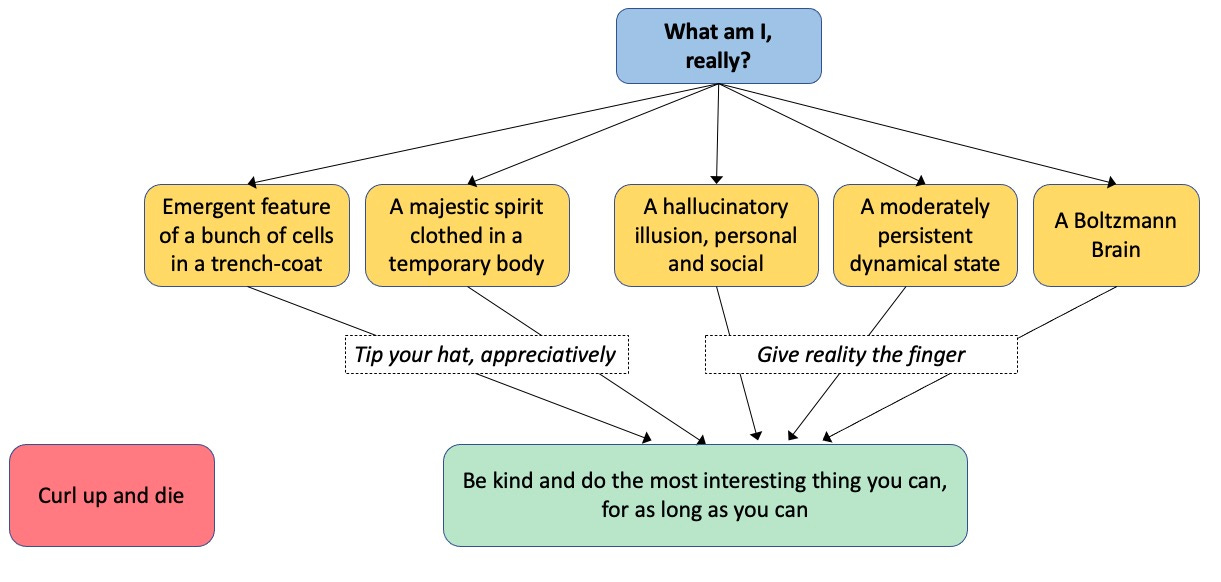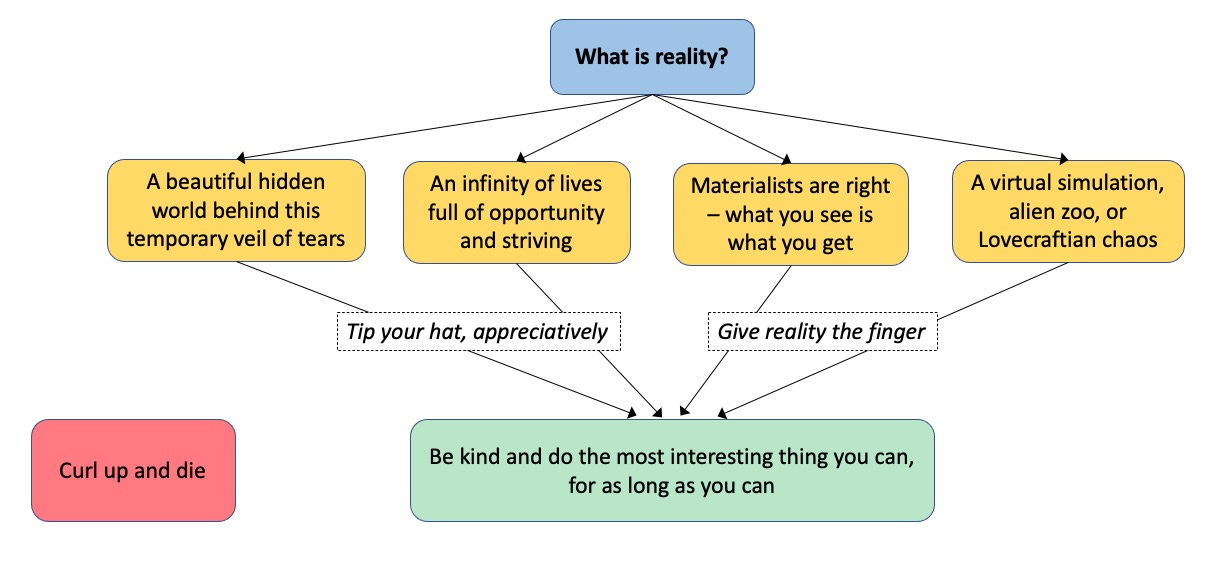Omnipedia #25: Accelerate or die!, intelligence at all levels, Orwell's hidden (and prophetic) wife, & more
Including: James Lovelock is not cheery, the world China is building, soft lefties and healing mensches

The summer wind is blowing in from across the sea… and look what it brings! A trends-letter by which you can steer the next month, thoughtfully and soulfully.
I hope you like—and if so, that you may wish to financially support. Button below, see you again at the end, best, PK x
Famous line: “It’s easier to imagine the end of the world than the end of capitalism.” As the Tory grotesques squeal at finding an attack-line on Starmer-Labour, casting them as nanny-state green authoritarians who want you to stop driving so you can save the planet (bastards!), the line seems more pertinent than ever.
My taste is sometimes more to excess than restraint - we maybe see the outcome we want to avoid more clearly, if we take imaginative license and push the hated tendency to an artistic extreme.
I would thus like to see Jake Chapman’s Accelerate or Die! (trailer above, and you’ll catch it at upcoming festivals and streaming platforms). It interviews and illustrates some leading voices of Accelerationism. “Acc” is a creed that’s swung from left to right and back again. It either pushes the accelerator on capitalism to make it implode and herald something better (optimist’s view). Or does the same in order for it to collapse and obliterate human civilisation (nihilist’s view).
“Decelerate or die” is the obvious retort from de-growthers, which I would generally agree with - although I wonder if we can hack around with the term, and propose a “receleration”, which harnesses runaway technology to stewardship and regeneration of the planet (see the James Lovelock view, in the item below). But with a recent encomia from Irvine Welsh, Accelerate or Die! looks like it might at least be instructive fun, as it veers the juggernaut towards the Precipice.
In my tracking of artificial consciousness through Mark Solms’ work, I’ve come across Micheal Levin (often in conversation with Solms). Levin’s stuff has just properly clicked with me via the above video (and its transcript).
…The magic of developmental biology is that there is a mechanism by which all of these cells get together, and they are able to cooperate towards large-scale goals. This is the notion that biology uses what I call a "Multi-scale competency architecture," which basically means that we are not simply nested structurally in terms of cells which comprise tissues, comprising organs, and bodies, and then ultimately societies and so on — that's obviously true on a structural level.
But more interesting is the fact that each of these layers has certain problem-solving competencies. Each one solves problems in their own space, so cells are simultaneously solving problems in physiological spaces and metabolic spaces and gene expression spaces, and tissues and organs are solving those problems. But, for example, during embryogenesis or regeneration, they're also solving problems in anatomical space. They're trying to navigate a path from the shape of an early embryo or a fertilized zygote all the way up to the complexity of a human body with all of the different types of organs and structures.
So the competency architecture refers to the fact that all of the parts inside of us and inside of all other creatures are themselves competent agents with preferences, with goals, with various abilities to pursue those goals, and other types of problem-solving capacities. What evolution has given us is this remarkable architecture where every level shapes the behavioural landscape of the levels below — and the levels below do clever and interesting things that allow the levels above not to have to micromanage, and to be able to control in an interesting top-down capacity.
After that, you may be feeling as if your sovereign self has been dissolved into various levels of bodily competencies, like a modern corporate bureaucracy (hmm). But Levin is also interested (in drawing these maps for his kids) about what you actually do with your life, even with if you have teeming frameworks of biological cooperation weighing on your mind. See below, taken from this 𝕏 thread:
Someone has also made him into a LevinBot. Which, when asked, dispatched my snarky critical theory in the appropriate manner, below:
I really liked James “Gaia Hypothesis” Lovelock’s last book Novacene (which I covered for the National here), especially for its leap into full-blown AI-dom. The neatest bit is where Lovelock notes that “both computers and humans start to expire and malfunction when the planet’s temperature gets close to 50C…So these super-intelligences will need human assistance in stabilising the Earth’s conditions. We will have – at least in the early days – a mutual interest. Humans and AI’s will both need to rebel against our extinction.” Well, there’s a relief!
However, someone recently 𝕏’d a 2008 interview with Lovelock that puts the doom-scrolling prophetic shivers right up you:
Lovelock believes global warming is now irreversible, and that nothing can prevent large parts of the planet becoming too hot to inhabit, or sinking underwater, resulting in mass migration, famine and epidemics. Britain is going to become a lifeboat for refugees from mainland Europe, so instead of wasting our time on wind turbines we need to start planning how to survive. To Lovelock, the logic is clear. The sustainability brigade are insane to think we can save ourselves by going back to nature; our only chance of survival will come not from less technology, but more.
Nuclear power, he argues, can solve our energy problem - the bigger challenge will be food. "Maybe they'll synthesise food. I don't know. Synthesising food is not some mad visionary idea; you can buy it in Tesco's, in the form of Quorn. It's not that good, but people buy it. You can live on it." But he fears we won't invent the necessary technologies in time, and expects "about 80%" of the world's population to be wiped out by 2100. Prophets have been foretelling Armageddon since time began, he says. "But this is the real thing." [For references that only confirm Lovelock’s visions, see links in the first pars of this recent Alternative Global post - PK]
Still wrangling with myself as to whether the coming climate catastrophe, steadily embraced, will turn me into a Third Act radical, or a Bukowskian art-hedonist. (I’m still hanging on for an alternative hedonism. But it better hurry up…)
The poem below was written in 1934 by Eileen O’Shaughnessy, George Orwell’s first wife, who - as this Guardian piece relates - was the hidden companion to Orwell in his reporting on the Spanish Civil War, the editor of Animal Farm, and an intellectual whose domestic and social labour enabled his early-to-mid career. The piece mentions an extraordinary futuristic poem O’Shaughnessy wrote, End of the Century, 1984, which I tracked down, reprinted here below:
End of the Century, 1984 Death Synthetic winds have blown away Material dust, but this one room Rebukes the constant violet ray And dustless sheds a dusty gloom. Wrecked on the outmoded past Lie North and Hillard, Virgil, Horace, Shakespeare's bones are quiet at last, Dead as Yeats or William Morris. Have not the inmates earned their rest? A hundred circles traversed they Complaining of the classic quest And, each inevitable day, Illogically trying to place A ball within an empty space. Birth Every loss is now a gain For every chance must follow reason. A crystal palace meets the rain That falls at its appointed season. No book disturbs the lucid line For sun-bronzed scholars tune their thought To Telepathic Station 9 From which they know just what they ought: The useful sciences; the arts Of telesalesmanship and Spanish As registered in Western parts; Mental cremation that shall banish Relics, philosophies and colds-- Manana-minded ten-year-olds. The Phoenix Worlds have died that they may live, May plume again their fairest feathers And in their clearest songs may give Welcome to all spontaneous weathers. Bacon's colleague is called Einstein, Huxley shares Platonic food, Violet rays are only sunshine Christened in the modern mood, In this house if in no other Past and future may agree, Each herself, but each the other In a curious harmony, Finding both a proper place In the silken gown's embrace.
“Telepathic Station 9” is the indie-schmindie band you’re listening to that doesn’t even exist yet (but will). As well as a channel you may be able to tune into via your soon-come mind-reading Airpods (more context here). [HT Julie Bertagna]
🚩Agonising from “soft lefties” in Labour here. Not sure how it might be engineered, but the optimal result for all at the next UK General Election is a multi-party “progressive majority”, which might usher in the proportionally-representative voting system that’s put the Greens in government, along with the SNP, in Scotland. Given the way Labour is treating comrade Lawson, I very much doubt such a thing will happen under a full Labour majority. Meantime, a coming Scottish by-election will test whether there’s a robust civic majority for independence - one which might still vote for an SNP that’s been somewhat shop-soiled by recent scandals. Party-politics on these islands still a circle of bubbling, unpredictable cauldrons.
Recelerations…
The Invisible Heart: Postgrowth Economy As Care, the usual great sweep of an essay from Tim Jackson
“Enheduana is the first known named author. Her poems of strife and upheaval resonate in our own unstable times” (Aeon)
“The World China Is Building”. Noema’s Jacob Dreyer writes the most interesting, non-doctrinaire pieces about the complex counter-currents of Chinese national life - always worth reading.
It lingered there, to touch your hair, and walk with me… That’s all for this week. If this has been interesting and enlightening, then please support financially via the button below. Love, onwards, PK x






